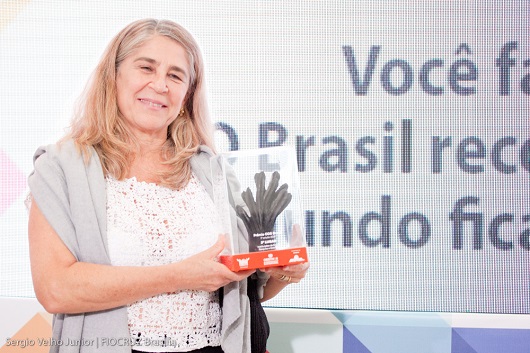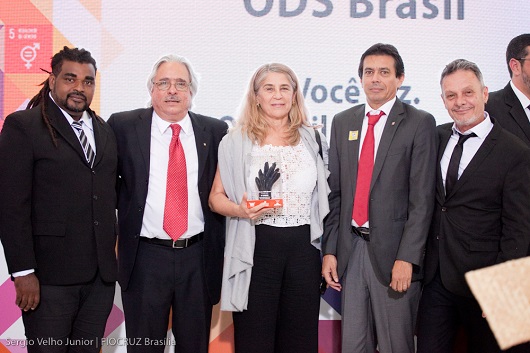Fiocruz wins 2018 SDG Brazil Award
27/12/2018
Nathállia Gameiro (Fiocruz Brasília)
The Technological Platform for Participative Monitoring in Zoonosis Emergence, coordinated by the researcher Márcia Chame, was one of the winning initiatives in the 2018 SDG Brazil Award, in the Teaching, Research, and Extension category, granted by the Government Secretariat of the Presidency of Republic. The ceremony was performed on the last Thursday (12/13), in Planalto Palace, Brasília.

Coordinated by the researcher Márcia Chame, the Technological Platform for the Participatory Monitoring of Zoonoses Emergency was one of the winning initiatives of the SDG Brazil 2018 Award (photo: Sergio Vellho Junior, Fiocruz Brasília)
“Receiving an award is always very good, as the acknowledgement feeds our will to work more and to search for new solutions. Having a nationally recognized work is sensational. My team is composed by many youngsters, and I hope they become very strengthened with these conquests”, celebrated the researcher Márcia Chame. The vice-president of Environment, Attention, and Health Promotion of Fiocruz, Marco Menezes, and the coordinator of the Fiocruz Strategy for the 2030 Agenda (EFA 2030), Paulo Gadelha, honored the event together with other researchers from the institution.
The trophy, shaped as a mandacaru cactus - the symbol of resistance in the Northeastern Sertão and of difficulty overcoming, was manufactured by artisans from Várzea Queimada, a community located in the rural area of Jaicós municipality, in the countryside of Piauí state, and has design made by Marcelo Rosenbaum. The sculpture is made of truck tire rubber, a material used in the region to manufacture several objects, mainly slippers.
Launched in 2014, the Fiocruz project that won the 3rd place in the category is a tool that enables any person to record and monitor wild animals with georeferencing. It is possible to enter data on abnormalities such as wounds and changes in the fauna behavior and the environmental features. “Health data are not georeferenced in Brazil and this limits the ability to work with prevention and control models”, claims Chame. The researcher explains that the application also promotes citizen science, as it enables people to engage in the animal monitoring process. For Márcia, it also enables the society to know the relationship between wild life health and people's health and to rethink about their way of life: the biodiversity conservation, which can improve health and modify the disease-transmission process, and at the same time the environmental impacts and degradation, which make some diseases to reappear.

Fiocruz's Vice President for Environment, Health Care and Promotion, Marco Menezes, and the coordinator of the Fiocruz Strategy on Agenda 2030, Paulo Gadelha, honored the event alongside other researchers at the institution (photo: Sergio Vellho Junior, Fiocruz Brasília )
The information entered in the application is analyzed by researchers, which relate the occurrences to several data on socioenvironmental infrastructure, environmental modifications, and climatic and soil use changes, intending to understand how is this dynamic works compared to the ever-changing world and why do some diseases present outbreaks in certain locations, disappear in some locations, and persist in other places. More than 58 communities have already used the application, from Northern to Southern regions in the country. With its use and the people's return, more than 200 improvements were already performed in the application. “This shows how the traditional and scientific knowledges can add, aggregate, and build each other”, the researcher highlights.
The 2018 SDG Award is an initiative by the Federal Government. Overall, 1,038 initiatives were enrolled. Thirty-nine out of those initiatives were selected to the final step, in the following categories: Profitable; Teaching, Research, and Extension; Government; and Non-Profit. The evaluating Technical Committee was composed by representatives from the Government Secretariat, the Instituto de Pesquisa Econômica Aplicada [Institute of Applied Economic Research] (Ipea), the National School of Public Administration (Enap), and the Ministry of Health.
There was another Fiocruz initiative among the finalists: the Observatory of Sustainable and Healthy Territories in Bocaina. The researchers Vagner Nascimento and Edmundo Gallo received the Merit Award plate. The Observatory was created in 2009 in partnership with the (Forum of Traditional Communities, acting in Serra da Bocaina region, in the territory formed by Ubatuba (SP) and Paraty and Angra dos Reis (RJ) municipalities, intending to reduce the conflict situations and to promote territorial development. There are more than 100 caiçara, indigenous, and quilombola traditional communities there.
The launch of a practice base was announced during the ceremony, and such base will serve as reference to implement and spread social, environmental, economic, and institutional projects in the 2030 Agenda. The Chief of Staff of the Office of the President, Eliseu Padilha, the Government Secretary, Carlos Henrique Sobral, and the Secretary of Social Articulation, Henrique Villa, were present.


